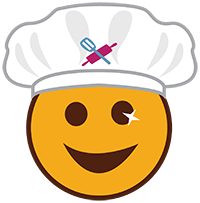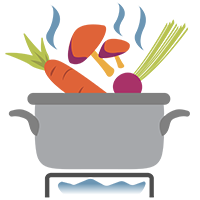Freckled Magic Swirl Pancakes

Freckled Magic Swirl Pancakes
You might be wondering what pancakes have to do with magic, or freckles for that matter. Well, the magic comes in the form of the fun Cinnamon Swirl kids will make in their batter as their pancakes cook and the resulting pattern and flavor. The freckles are the Cinnamon Crunch on top! Kids can get creative making their own swirl designs with both the cinnamon and the Dreamy Glaze!
Happy & Healthy Cooking,
Fun-Da-Mentals Kitchen Skills
- melt :
to heat a solid food so it becomes liquid, like butter or chocolate.
- swirl :
to create a swirl design by lightly stirring a food with a toothpick, or other cooking or eating utensil, in a circular or other pattern.
- toast :
to brown and crisp food in a heated skillet or oven, or in a toaster.
Equipment Checklist
- Skillet
- Measuring spoons
- Dry measuring cups
- Whisk
- Liquid measuring cup
- Quart-sized ziplock bag
- Kid or kitchen scissors
- Medium mixing bowl
- Pancake turner
Ingredients
Freckled Magic Swirl Pancakes
- Cinnamon swirl:
- 4 T unsalted butter **(for DAIRY ALLERGY sub dairy-free/nut-free butter, like Earth Balance, or vegetable oil)**
- 2 tsp ground cinnamon **(for CINNAMON ALLERGY sub cocoa powder, nutmeg, or allspice)**
- 1/4 C packed brown sugar
- Pancakes:
- 1 C all-purpose flour **(for GLUTEN ALLERGY sub gluten-free/nut-free all-purpose flour + more milk if needed)**
- 2 tsp baking powder
- 1/2 tsp salt
- 1 C milk **(for DAIRY ALLERGY sub dairy-free/nut-free milk)**
- 1 egg **(for EGG ALLERGY sub additional baking powder + vegetable oil—more info below)**
- 1 T vegetable oil
- 1 T butter for cooking **(for DAIRY ALLERGY sub vegetable oil)**
Food Allergen Substitutions
Freckled Magic Swirl Pancakes
- Dairy: For Cinnamon Swirl, substitute dairy-free/nut-free butter or vegetable oil for butter. To cook pancakes, substitute vegetable oil for butter. Substitute dairy-free/nut-free milk.
- Gluten/Wheat: Substitute gluten-free/nut-free all-purpose flour and add more milk as needed to thin pancake batter.
- Egg: For 1 egg, increase baking powder from 2 tsp to 2 T and vegetable oil from 1 T to 2 T.
- Cinnamon: Substitute cocoa powder, nutmeg, or allspice.
Instructions
Freckled Magic Swirl Pancakes
add + melt + cool
Have kids add 4 tablespoons butter, 2 teaspoons cinnamon, and 1/4 cup brown sugar to a skillet. Melt the butter and whisk in the sugar and cinnamon. Older kids can carefully help with this. Once the butter and sugar are melted together, turn off the skillet and let the mixture cool slightly.
scoop + pour + wipe
Scoop or carefully pour the mixture into a liquid measuring cup. From there, pour it into a quart-sized plastic bag, snip a small corner of the bag, and set it aside until it’s time to make the pancakes. Wipe out your skillet with a wet paper towel, so the sugar doesn’t burn.
measure + whisk
In a mixing bowl, have kids measure 1 cup flour, 2 teaspoons baking powder, 1/2 teaspoon salt, 1 cup milk, 1 egg, and 1 tablespoon vegetable oil. Then whisk until a smooth batter forms.
drop + squeeze + cook + flip
Heat 1 tablespoon of butter in your skillet. Next, drop about 2 tablespoons of batter per pancake into your skillet. Then squeeze the Cinnamon Swirl mixture out from the center of each pancake (being careful not to go right to the edges). When bubbles form on the pancakes, carefully flip them to cook the other side.
serve + top
Serve and top each pancake with Dreamy Glaze and Cinnamon Crunch (see recipes)!

Hi! I’m Cinnamon!
"Did you know that I'm a spice that comes from the inner bark of certain trees?! You can add me to both sweet and savory foods. Recipes generally call for ground cinnamon, but you can also use cinnamon sticks, dried strips of my bark that curl into a tube shape, to flavor apple cider, stews, curries, and more. Just don't forget to remove the stick before serving! And, what's more, I can make your kitchen and home smell wonderful!"
History
- Some people say the best kind of cinnamon, referred to as the "true cinnamon" and called Ceylon, is native to an island southeast of India called Sri Lanka. It has a more subtle flavor than other types. The most common cinnamon in use today, though, is derived from Cassia, which originated in China.
- Cinnamon is an ancient spice. It was imported to Egypt in about 2000 BCE. The ancient Egyptians used cinnamon together with myrrh to embalm the dead. They considered cinnamon to be more valuable than gold!
Anatomy & Etymology
- Cinnamon is the inner bark of some tree species of the genus Cinnamomum. Cinnamon trees can grow about 60 feet tall.
- Cinnamon farmers begin to harvest cinnamon when the tree reaches two years old. They cut the tree back so that shoots form from the stump. After one more year, the farmers strip the outer bark from the shoots and set the peels out to dry in the sun.
- When the bark dries, it curls into "quills," which are the sticks that are cut and sold as cinnamon sticks. They can also be ground into powdered cinnamon, which is how much of the cinnamon we see is sold in stores. So, what do a porcupine and a cinnamon tree have in common? They both grow quills!
- The word "cinnamon" comes from late Middle English derived from the Old French form, "cinnamome," from the Greek "kinnamon." The Greek was borrowed from a Phoenician word, which was similar to the related Hebrew word "qinnāmōn."
How to Pick, Buy, & Eat
- Cinnamon is harvested twice a year, immediately after the rainy season. The humidity in the air makes the bark peel more easily.
- The bark is typically peeled by hand by skilled peelers.
- The quality of cinnamon is judged by the thickness of the bark, the appearance of the quills (broken or whole), the aroma, and the flavor.
- Cinnamon is a spice used to add flavor to a variety of dishes. For example, it may be added to desserts, chocolate, toast (in cinnamon sugar), fruit (especially apples), roasted veggies, soups, tea, and hot cocoa. It's also good in savory dishes like Bavarian pot roast, Moroccan chicken, and Indian curry.
Nutrition
- It is best to eat cinnamon in small doses in its ground form, sprinkling it on top of food or adding a small teaspoon to food. Eating too much cinnamon could cause adverse health effects.
- Cinnamon has one of the most recognizable scents. Its pungent, spicy smell is due to the chemical called "cinnamaldehyde." This chemical is considered an antioxidant that has some anti-inflammatory and antibacterial properties.
- Cinnamon is believed to regulate the sugar in our blood and possibly lower cholesterol; however, study findings aren't clear.
- Cinnamon oil can keep mosquitoes away! It kills mosquito larvae and probably repels adult mosquitoes, too.
History of Pancakes!

- Archaeological evidence suggests that pancake varieties are probably the earliest and most widespread foods made from cereal grains. Prehistoric societies mixed dry, carbohydrate-rich seed flours with available protein-rich liquids, usually milk and eggs, and baked the resulting batters on hot stones or in shallow earthenware pots over an open fire. These early pancakes formed a nutritious and highly palatable foodstuff.
- Pancakes are a universal food found in some variations from Africa to Asia to Europe and South America.
- Globally, there are at least 100 types of pancakes. To name a few, they include crepes, blinis, latkes (potato pancakes), pajeon, æbleskiver, crumpets, galettes, okonomiyaki, milcao, and Dutch baby pancakes.
- A pancake is usually a flat, round cake prepared from a batter and cooked on a hot griddle or frying pan. In some countries, it's thinner, more like a crepe, and in the United States, it's usually thicker and more fluffy.
- Most pancakes are quick breads; however, some use a yeast-raised or fermented batter.
- Pancakes can be sweet or savory. Depending on the region, pancakes may be served at any time, with various toppings or fillings, including jam, chocolate chips, fruit, syrup, or meat.
- In different parts of the US, pancakes may be called flapjacks, griddle cakes, hotcakes, or slapjacks.
- One man (and giant pancake fan!) ran a marathon while tossing a pancake every 2 seconds for a continuous 3 hours, 2 minutes, and 27 seconds!
Let's Learn About Magic (Illusion)!

- If you've seen someone doing card tricks, you are familiar with the art of illusion. The goal of magic performers is to amaze their observers and get them to ask, "How did you do that?"
- The history of magic goes back to ancient Greece and Persia. Those two countries fought each other for many, many years, and the Greeks referred to the Persian priests with their magical practices as "magoi" and their ritual acts as "magika."
- During the 17th century, magic shows at fairs were a popular form of entertainment, and many books about magic were written. A French watchmaker in the early 1800s, Jean-Eugène Robert-Houdin, is considered the father of modern illusionism. He performed in theaters to more wealthy audiences and began the tradition of dressing in evening wear with tails.
- A familiar trick, "cups and balls," has been around since 3 BCE! A magician has three upside-down cups on a table and puts a ball under one of the cups. The performer moves the cups quickly around the table to confuse their observers, and then they ask someone to guess which cup holds the ball, and most aren't able to choose the correct one. This trick requires skills of dexterity, sleight of hand, and misdirection.
- Today, many magic performers are well-known for their street magic and spectacular TV specials. Learning to perform magic is also popular among school-age children, and toy stores often sell magic kits to help kids with their illusions. You may have even tried to do magic tricks yourself!




